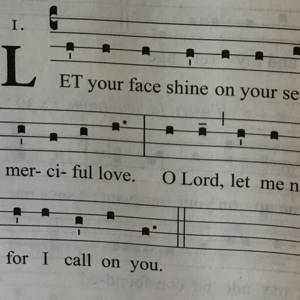
 R. WEBER’S LANDMARK book The Proper of the Mass for Sundays and Solemnities published by Ignatius Press is a great gift to the Church. He bends over backwards to make the propers as user friendly as possible. The texts are in English. There are multiple settings of each proper, which accommodates choirs of varying levels. Each psalm verse is written out. One could not ask for anything more.
R. WEBER’S LANDMARK book The Proper of the Mass for Sundays and Solemnities published by Ignatius Press is a great gift to the Church. He bends over backwards to make the propers as user friendly as possible. The texts are in English. There are multiple settings of each proper, which accommodates choirs of varying levels. Each psalm verse is written out. One could not ask for anything more.
A Publication like this begs an interesting question. What would the state of liturgical music look like today if such a resource were available immediately after Vatican II and many parishes adopted it? While difficult to imagine a typical parish adopting this today, fifty years ago, such a publication would have provided continuity. For many, it may have been a natural outcome of Vatican II.
While much of the confusion and misunderstanding following Vatican II was inevitable, such a collection would have set a model as did the works of Theodore Marier with hymnody, psalms settings, and singing the mass. But with respect to the propers, the hole we are digging ourselves out of would perhaps not be quite as deep. “Option 4” of the GIRM would not be the default setting as readily as it is today.
BUT CONJECTURE IS USELESS. History has played itself out and continues to do so. We have had fifty years to look upon the great successes and failures of the implementation and interpretation of Vatican II. That this resource—and a flood of new ones—are becoming available, points to a new awakening in the Church. Even mainstream publishers are beginning to take notice and provide new resources. We are only at the dawn of this awakening, but the sun is rising.
Death is necessary for rebirth. Despite Vatican II’s call for a renewal in Gregorian Chant, its death was nearly universal save a few beacons of light that kept it alive. What we are experiencing now is the rising after death. Progress may appear very slow to us, but what is true will always live on.

This article is part of a series on Fr. Weber’s Book of Propers:
